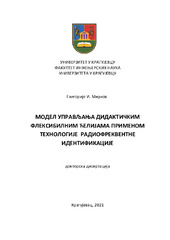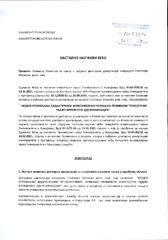Приказ основних података о дисертацији
Model upravljanja didaktičkim fleksibilnim ćelijama primenom tehnologije radiofrekventne identifikacije
ǂThe ǂmanagement model of didactic flexible cells using technologies of radio frequency identification
| dc.contributor.advisor | Stefanović, Miladin | |
| dc.contributor.other | Nedić, Bogdan | |
| dc.contributor.other | Đorđević, Aleksandar | |
| dc.contributor.other | Desnica, Eleonora | |
| dc.creator | Mirkov, Gligorije | |
| dc.date.accessioned | 2022-12-03T09:49:33Z | |
| dc.date.available | 2022-12-03T09:49:33Z | |
| dc.date.issued | 2022-04-01 | |
| dc.identifier.uri | http://eteze.kg.ac.rs/application/showtheses?thesesId=8591 | |
| dc.identifier.uri | https://fedorakg.kg.ac.rs/fedora/get/o:1547/bdef:Content/download | |
| dc.identifier.uri | https://nardus.mpn.gov.rs/handle/123456789/20973 | |
| dc.description.abstract | Fleksibilni proizvodni sistemi (FMS) kao složena i stohastička okruženja iziskuju dalji razvoj inovativnih, inteligentnih upravljačkih arhitektura u cilju poboljšanja fleksibilnosti, agilnosti i rekonfigurabilnosti. Distributivni upravljački sistem, kao podsistem upravljanja FMS, bavi se ovim izazovom, uvođenjem optimalnog upravljanja procesom koji je podržan od strane autonomnih upravljačkih jedinica koje sarađuju međusobno. Klasični sistemi upravljanja transportom imaju nedostatak fleksibilnosti i agilnosti, naročito u slučajevima kada je raznovrsnost proizvoda i zastupljenost delova manjeg gabarita velika. U takvim slučajevima sistem je neosetljiv za slučajne „ad-hok” događaje. Pored praćenja, identifikacije i kategorizacije delova putem tehnologije radio frekventne identifikacije (RFID), korišćenjem iste, uvedena su u model upravljanja tehničko-tehnološki parametri. Fleksibilni sistem tada ostvaruje mogućnost rada u realnom vremenu procesa, i oslobađa računarske resurse za druge zadatke. Takođe fleksibilni sistem dobija karakter adaptivnog inteligentnog sistema. Naučni cilj doktorske disertacije je poboljšani model upravljanja didaktičkog fleksibilnog proizvodnog sistema zasnovanog na RFID tehnologiji i računarskoj inteligenciji, i predstavlja doprinos razvoja Industrije 4.0. Upotreba savremenih tehnologija, na prvom mestu informaciono komunikacionih tehnologija ima veliki uticaj na sve aspekte upravljanja proizvodnim sistemima. Ispitivani model, iz kog proizlazi softversko rešenje, pruža mogućnost da osmišljena arhitektura fleksibilne proizvodne ćelije pokaže da je predočeni okvir sposobniji od većine implementiranih u sadašnjoj obrazovnoj i proizvodnoj praksi, naročito ako je proces dinamičan, nepoznat upravljanju i ima zahteve rekonfigurabilnosti. Ciljna grupa obuhvata didaktične fleksibilne ćelije (FMC) čiju konfiguraciju čine: CNC mašine, dodavači materijala i robot koji ih opslužuje. Istraživanje je obavljeno na ćelijama i opremi najviše zastupljenoj u obrazovnom sistemu Republike Srbije. Kako se model upravljanja odnosi na didaktičke FMC, rešavanju upravljačke problematike priključene su i postavke koje sagledavaju elemente didaktičkog pristupa, što uključuje stepen percepcije, učenje i proširenje znanja, zaključivanje i reakciju slušalaca. Testiranje, verifikacija i validacija razvijenog modela upravljanja FMC realizovana je korišćenjem evidencionih mreža, primenom softvera McEvidence i analizom modela upravljanja za dva tipa didaktičkih fleksibilnih ćelija. Testiranjem ispitivanog modela potvrđuju se postavljene hipoteze i daje se prostor za dalja istraživanja i unapređenja što je i predočeno u zaključnim razmatranjima doktorske disertacije. | sr |
| dc.description.abstract | Flexible manufacturing systems as complex and stochastic environments require the development of innovative, intelligent control architectures in order to improve flexibility, agility and reconfiguration. The distribution management system, as a subsystem of FMS management, addresses this challenge, introducing the optimal process management that is supported by autonomous management units cooperating with each other. Classic transport management systems lack flexibility and agility, especially in cases where the variety of products and the representation of smaller parts is large. In such cases, the system is insensitive to random "ad-hoc" events. In addition to the monitoring, identification and categorization of parts via radio frequency identification (RFID) technology, using the same, the technical-technological parameters were introduced into the management model. The flexible system then enables the possibility of working in real time of the process, and frees up computer resources for other tasks. Also, the flexible system acquires the character of an adaptive intelligent system. The scientific goal of the PhD dissertation is to improved the management model of a didactic flexible production system based on RFID technology and computer intelligence, and represents a contribution to the development of Industry 4.0. The use of modern technologies, primarily information and communication technologies, has a great impact on all aspects of production systems management. The tested model, the software solution is derived from, provides an opportunity for the designed architecture of a flexible production cell to show that the presented framework is more efficient than the most implemented ones in the current educational and production practice, especially if the process is dynamic, unknown to management and has reconfigurability requirements. The target group includes didactic flexible cells (FMC) whose configuration consists of: CNC machines, material feeders and the robot that serves them. The research was performed on cells and equipment most represented in the educational system of the Republic of Serbia. As the management model refers to didactic FMC, the solution of management problems is accompanied by settings that consider the elements of the didactic approach, which includes the degree of perception, learning and expansion of knowledge, the reasoning and reaction of listeners. The testing, verification and validation of the developed FMC management model was realized using record networks, applying the McEvidence software and analysing the management model for two types of didactic flexible cells. By testing the examined model, the set hypotheses are confirmed and space is given for further research and improvements, which is presented in the concluding remarks of the doctoral dissertation. | en |
| dc.format | application/pdf | |
| dc.language | sr | |
| dc.publisher | Универзитет у Крагујевцу, Факултет инжењерских наука | sr |
| dc.rights | openAccess | en |
| dc.rights.uri | https://creativecommons.org/licenses/by/4.0/ | |
| dc.source | Универзитет у Крагујевцу | sr |
| dc.subject | Robot | sr |
| dc.subject | Robot | en |
| dc.subject | RFID | sr |
| dc.subject | Tag | sr |
| dc.subject | FMC | sr |
| dc.subject | FMS | sr |
| dc.subject | Agent | sr |
| dc.subject | Macro | sr |
| dc.subject | CNC mašine | sr |
| dc.subject | RFID | en |
| dc.subject | Tag | en |
| dc.subject | FMC | en |
| dc.subject | FMS | en |
| dc.subject | Agent | en |
| dc.subject | Macro | en |
| dc.subject | CNC machines | en |
| dc.title | Model upravljanja didaktičkim fleksibilnim ćelijama primenom tehnologije radiofrekventne identifikacije | sr |
| dc.title.alternative | ǂThe ǂmanagement model of didactic flexible cells using technologies of radio frequency identification | en |
| dc.type | doctoralThesis | |
| dc.rights.license | BY | |
| dc.identifier.fulltext | http://nardus.mpn.gov.rs/bitstream/id/147652/Gligorije_Mirkov_FIN.pdf | |
| dc.identifier.fulltext | http://nardus.mpn.gov.rs/bitstream/id/147651/Doctoral_thesis_12809.pdf | |
| dc.identifier.rcub | https://hdl.handle.net/21.15107/rcub_nardus_20973 |



